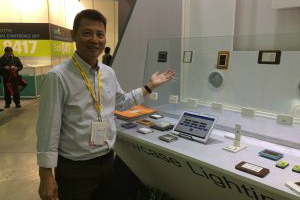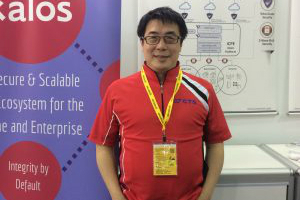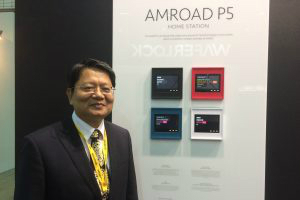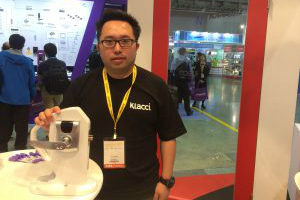Since the notion of smart home first surfaced years ago, many businesses have dived into related development in the field, investing much resource and believing that smart home and the Internet of Things (IoT) will be the next big thing. However, the industry seemed...
Since the notion of smart home first surfaced years ago, many businesses have dived into related development in the field, investing much resource and believing that smart home and the Internet of Things (IoT) will be the next big thing. However, the industry seemed to get off to a slow start, as market response has not been as warm as expected.
Nevertheless, the IoT’s importance was never played down by the government, as countries around the globe, including Taiwan, have written smart home or IoT development into national development policies. After years of tepid growth, the industry might finally begin to take off, based on surveys conducted with Taiwanese exhibitors at SMAhome Expo 2017, the only trade show in Asia dedicated to the smart home industry.
Howard Yeh, President of G-Light Technologies said he has been in the industry for 10 years, and it is not until the last 2-3 years that the smart home industry started to garner momentum, because many “big shots” in the IoT industry, in raw material and system industries, for example, have stepped up. “I think it is undergoing rapid development,” Yeh said.
G-Light has been an original design manufacturer working with large IoT companies based in the U.S. After seeing many mergers between service and IT companies in the U.S., Yeh believes the smart home market is gaining traction.
 Howard Yeh, President of G-Light Technologies
Howard Yeh, President of G-Light Technologies
There is also unmet demand. G-Light works with construction firms in Taiwan, and Yeh said many light-current systems in old apartments are in need of replacement. The company provides smart switches that can turn on (and off) multiple lights for a “scene.” G-Light’s strength lies in combining electrical engineering expertise with lighting effect design.
Home automation needs to create comfort while conserving energy, and this is what G-Light’s smart switches aim to accomplish. Its customers comprise of local distributors and foreign buyers.
Still much unfulfilled demand
Jack Lien, President & CEO of WFE Technology Corp., said he is “very optimistic” about smart home development in the future.
WFE Technology Corp. is one of the main electronic lock providers in Taiwan, and about five years ago, the company started to install smart locks in new home projects. Its products are sold under the brand name of Waferlock, mostly in Taiwan.
About three years ago smart home application turned more popular with the arrival low-power Bluetooth 4.0 and 4G, Lien said. Faster transmission is necessary to render user friendly experience, Lien said. “We decided to jump in (smart home) because 4G can provide more inclusive services.”
There were hurdles of smart home implementation, including software and hardware issues and the high cost that are simply not acceptable to average consumers. However, the market became more mature in recent years, as the value, benefits and functionalities of IoT are now more relatable to everyone. “Consumers feel that smart home can bring real convenience, and perceive it not just a gimmick,” Lien noted.
“Smart home implementation, especially in Taiwan, grew rapidly over the past two years. It is similar to 10-20 years ago when we pushed for electronic locks,” said Lien, who expects smart home adoption to grow as fast as electronic lock adoption in the early years.
Lien says he personally believes smart home will be a norm in the future, largely because the new technologies’ feasibility and usefulness have out-performed the old ones.
The company works mostly on new home projects and is more confident about the potential in Asia. DIY products are more popular in western market due to local regulations.
Taiwan may leverage its information and computer technology
Many local companies also believe Taiwan is well positioned to take advantage of the emerging IoT industry.
Charles Yuan, Senior Manager of Connection Technology Systems Inc.’s (CTS)
IoT Business Development Dept., said “Taiwanese companies are actually suited for the IoT industry, which ultimately is about providing services.” It requires collaboration between IT firms and professional service providers who possess the domain knowledge, in healthcare or security industries, for example.
 Charles Yuan, Senior Manager of Connection
Charles Yuan, Senior Manager of Connection
Technology Systems
The know-how accumulated overtime is not something that traditional IT firms can copy, and their role is to help companies provide services better, faster and more effectively, Yuan said.
IoT is an opportunity for Taiwan because it is about integrating different ecosystems, or different industries. The question is how to integrate services provided by gateway, platform, sensor, Bluetooth, ZigBee, and app companies. Taiwan can be the source of technical expertise, while broader applications may be realized overseas.
CTS is a gateway provider that help platform clients – like cable operators and telecom companies – provide various smart home services, in security, healthcare and energy management applications, among others.
For the past couple of years, the company has targeted Sweden and Norway markets where local governments have actively pushed IoT development. This year CTS is eying opportunities in Japan, Taiwan and the U.S.
Its IoT gateway has enhanced security mechanism built-in, uses the Z-Wave wireless protocol, and is designed with 3G/4G backup as well as backup battery to ensure continuous data flow.
Focus in the Southeast Asian market
James Su, President of Amroad, a provider of smart door entry and intercom systems, also believes the smart home trend will not stop. “The trend is bound to continue and the question is in what way do you intend to enter the market?” Su said.
 James Su, President of Amroad
James Su, President of Amroad
Given its information and computer technology expertise, Taiwan is an important base for smart home development, Su stressed, adding that there are many innovative ideas here.
Amroad provides a comprehensive video-based system that includes intercom and access control designed for residential communities. The company works mostly with home builders and 80-90 percent of its clients come from abroad, mostly from India, Vietnam and Thailand.
With 12 years of experience in the industry, the company is looking to expand its international customer base. The company will focus on Southeast Asian countries first, given these countries’ similarity in lifestyle to Taiwan’s.
Deals can actually be made in an exhibition like SMAhome Expo, Su said. This year’s show is better because there were more visitors from overseas. However, there was much preparation beforehand. Over the years the company has made much investment on products’ aesthetic and technical improvement.
Many layers of technologies required for smart home implementation
 Jim Shen, Executive Assistant to General
Jim Shen, Executive Assistant to General
Manager at Klacci
Jim Shen, Executive Assistant to General Manager at keyless lock provider Klacci, also believes that there is demand in the market. “Visitors to our booth consist of professionals from construction companies. They are very clear about their requirement,” Shen said.
Shen is somewhat more conservative in his view on smart home development. “Every company has its own idea, but implementation is not as easy. There are many required technologies, which somewhat constraints what can actually be achieved. The concepts are there, but the implementation is not yet available.”
“That’s why we want to differentiate ourselves from others, making products that are easy to install,” Shen said. The company aims to turn today’s everyday product, smartphones, into keys.
The company makes door locks that can be unlocked through facial recognition, passcodes and/or fingerprint stored in a smartphone. The confidential information is stored in the cloud. Entry into the property is possible only after home owners have granted access.